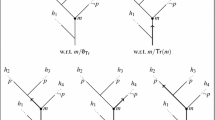Abstract
For branching-time temporal logic based on an Ockhamist semantics, we explore a temporal language extended with two additional syntactic tools. For reference to the set of all possible futures at a moment of time we use syntactically designated “restricted variables” called fan-names. For reference to all possible futures alternative to the actual one we use a modification of a difference modality, localized to the set of all possible futures at the actual moment of time.
We construct an axiomatic system for this extended branching-time logic and prove its soundness and completeness with respect to bundle tree semantics. Finally, we show how our axiomatic system can be extended with a variety of important additional operators, such as Since and Until, a global difference operator, operators for undivided and divided histories, reference pointers, etc.
Similar content being viewed by others
References
Blackburn, P., 1989, “Nominal tense logic,” Dissertation, Centre for Cognitive Science, University of Edinburgh.
Belnap, N., 1992, “Branching space-time,” Synthese 92, 385–434.
Bull, R., 1970, “An approach to tense logic,” Theoria 36(3), 282–300.
Burgess, J., 1979, “Logic and time,” Journal of Symbolic Logic 44, 556–582.
Burgess, J., 1980, “Decidability for branching time,” Studia Logica 39(2/3), 203–218.
de Rijke, M., 1989, “The modal logic of inequality,” Journal of Symbolic Logic 57(2), 566–584.
Di Maio, M.C. and Zanardo, A., 1994, “Synchronized histories in Prior-Thomason representation of branching time,” pp. 265–282 in Temporal Logic, Lecture Notes in Artificial Intelligence, Vol. 827, D. Gabbay and H.-J. Ohlbach, eds., Berlin: Springer-Verlag.
Di Maio, M.C. and Zanardo, A., 1996, “Gabbay-rule free axiomatization of T × W validity,” University of Padova, Department of Mathematics, Preprint No. 27, 1996.
Emerson, E.A., 1990, “Temporal and modal logic,” pp. 995–1072 in Handbook of Theoretical Computer Science, Vol. B, J. van Leeuwen, ed., Amsterdam: Elsevier.
Gabbay, D., 1981, “An irreflexivity lemma with applications to axiomatizations of conditions on tense frames,” pp. 67–89 in Aspects of Philosophical Logic, U. Monnich, ed., Dordrecht: Reidel.
Gabbay, D. and Hodkinson, I., 1990, “An axiomatization of the temporal logic with Since and Until over the real numbers,” Journal of Logic and Computation 1, 229–259.
Gargov, G. and Goranko, V., 1993, “Modal logic with names,” Journal of Philosophical Logic 22(6), 607–636.
Goranko, V., 1996, “Hierarchies of modal and temporal logics with reference pointers,” Journal of Logic, Language and Information 5, 1–24.
Goranko, V., 1998, “Axiomatizations with context rules of inference in modal logic,” Studia Logica 61, 179–197.
Gurevich, Y. and Shelah, S., 1985, “The decision problem for branching-time logic,” Journal of Symbolic Logic 50(3), 668–681.
Passy, S. and Tinchev, T., 1991, “An essay in combinatory dynamic logic,” Information and Computation 93(2), 263–332.
Prior, A., 1956, “Modality and quantification in S5,” Journal of Symbolic Logic 21(1), 60–62.
Prior, A., 1967, Past, Present, and Future, Oxford: Clarendon Press.
Stirling, C., 1992, “Modal and temporal logics,” pp. 478–563 in Handbook of Logic in Computer Science, Vol. 2: Computational Structures, S. Abramski, D. Gabbay and T. Maibaum, eds., Oxford: Clarendon Press.
Thomason, R., 1984, “Combinations of tense and modality,” pp. 135–165 in Handbook of Philosophical Logic, Vol. II, D. Gabbay and F. Guenthner, eds., Dordrecht: Reidel.
Venema, Y., 1991, “Many-dimensional modal logic,” Dissertation, Department of Mathematics, University of Amsterdam.
Venema, Y., 1993, “Derivation rules as anti-axioms in modal logic,” Journal of Symbolic Logic 58(3), 1003–1034.
von Kutschera, F., 1997, “T × W completeness,” Journal of Philosophical Logic 26(3), 241–250.
Zanardo, A., 1985, “A finite axiomatization of the set of strongly valid Ockhamist formulas,” Journal of Philosophical Logic 14, 447–468.
Zanardo, A., 1991, “A complete deductive system for Since-Until branching-time logic,” Journal of Philosophical Logic 20, 131–148.
Zanardo, A., 1996, “Branching-time logic with quantification over branches: The point of view of modal logic,” Journal of Symbolic Logic 61(1), 1–39.
Zanardo, A., 1998, “Undivided and indistinguishable histories in branching time logics,” Journal of Logic, Language and Information 7, 297–315.
Zanardo, A. and Carmo, J., 1993, “Ockhamist computational logic: Past-sensitive necessitation in CTL*,” Journal of Logic and Computation 3(3), 249–268.
Author information
Authors and Affiliations
Rights and permissions
About this article
Cite this article
Brown, M., Goranko, V. An Extended Branching-Time Ockhamist Temporal Logic. Journal of Logic, Language and Information 8, 143–166 (1999). https://doi.org/10.1023/A:1008398102653
Issue Date:
DOI: https://doi.org/10.1023/A:1008398102653




